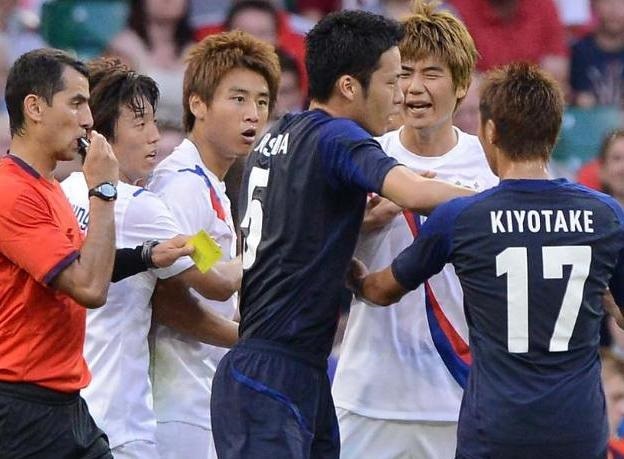by STEVE HAN
South Korean under-23 men’s soccer team is vying for a gold medal at the Asian Games for the first time in 28 years, but it will have to overcome arch rival Japan in the quarterfinal match on Sunday to have a shot at achieving the ultimate goal in Incheon next week.
Host nation South Korea advanced to the quarterfinals after beating Hong Kong 3-0 on Thursday in the round of 16. Led by head coach Lee Kwang-jong, the team won all four matches in the tournament so far and has yet to concede a goal. But Japan will pose the biggest threat for the Korea, which hasn’t faced serious competition thus far as its opponents included minnows such as Laos and Malaysia.
“I wanted to play South Korea here,” Japan head coach Makoto Teguramori told Kyodo News. “It doesn’t get any better than this. I mean, imagine what it would be like if Japan took the tournament away from Korea on their own turf. I can sense how badly Korea want to win this competition … We’ve got to be prepared mentally. We cannot allow ourselves to get beaten mentally.”
Since 2002, teams are only allowed to include players younger than 23 for men’s soccer at the Asian Games. FIFA, international soccer’s governing body, levies the age cap on international tournaments sanctioned by organizations other than itself (including the Summer Olympic Games) as part of its plan to make the World Cup the most glamorous soccer event in the world. As a compromise, men’s soccer teams at both the Asian Games and the Olympics, both organized by the IOC, can have up to three players over 23.
Although the age cap is at 23, the entire Japanese roster consists of players aged 21 or younger as Teguramori wants the less heralded Asian Games as something of a dress rehearsal for the 2016 Olympic Games in Rio de Janeiro, Brazil. Japan also played at the 2010 Asian Games in Guangzhou, China with its under-21 team, consisting of players who would still be young enough to satisfy the age limit at the Olympics in 2012, and still impressively managed to win the competition.
Unlike Japan, no player in South Korea’s roster is younger than 22. Additionally, head coach Lee further emphasized his “win now” mentality by even utilizing all three of his over-aged player slots with those who represented Korea’s senior national team at this past summer’s World Cup in Brazil. Taking the all-or-nothing approach at the expense of drawing a larger picture for the bigger tournament in the Olympics remains a hotly debated topic for Korean soccer fans.
However, such a decision for the Koreans is also the most suitable way to accommodate their most talented players from obtaining military exemption, which is granted to all of South Korea’s gold medalists at the Asian Games. Many believe that the country’s 21-month compulsory military service for all able-bodied male citizens is detrimental to the development of young athletes whose careers are generally short-lived compared to other professions.
Image courtesy of KPPA







